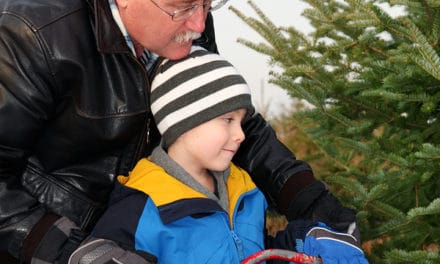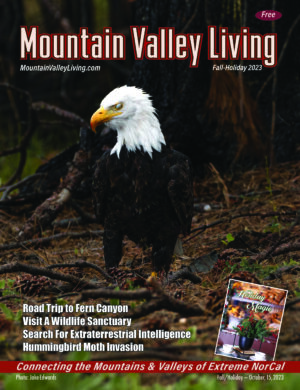by Lyn Walters
I love Christmas. I really do. I like all the shining lights, the beautiful wrapping paper and tinsel, and the decorations hanging in the shops and homes. I like the cookies and candies and the Holiday feasts. I like nutcrackers and The Nutcracker Ballet. I love Christmas trees. And people who decorate their yards with Christmas scenes all lit up so I can drive around and view them at night. I am no Scrooge.
But when I see Christmas merchandise being put up in stores before we’ve even had a chance to celebrate Halloween, it is clear to me that our collective concept of Christmas is struggling with a crisis of meaning. Everyone knows that Christmas is not just about buying more stuff. But what was it really about, again? Parties, family, food, that sort of thing, right?
To check in with a professional on the topic I turned to Pastor Donna Wood of the Community United Methodist Church of Quincy, California. “People all over the world and throughout time have had gift giving festivals,” she tells me. “To this the Church has developed a tradition of Advent or the focus on the waiting time before the light of Christ returns to the world again on Christmas day.
Advent calendars and Advent wreaths are part of this devotion.” Advent calendars! I used to love them as a kid. I loved opening all the little windows to find pictures of some sweet creature or fruit hiding there, and when Christmas day came I could open the big picture showing a manger scene. Advent wreaths were a new tradition to me. This involves making a wreath with five candles set in it. A new candle is lit every Sunday before Christmas and verses from scripture are read pertaining to the themes of hope, peace, joy and love, elements of what Christ brings into our lives. On Christmas day the final candle is lit representing Christ coming into the world. (There’s lots of Advent devotional material online which explains this tradition in deeper detail.)
Pastor Donna also stressed what families could do together particularly for those less fortunate. “It makes me so sad to think of some children getting everything under the sun while so many get next to nothing,” she says. She recommends parents consider this when buying gifts for their children, and is an advocate of donating generously to charity toy and food drives.
Other traditions that the Church has developed over the centuries are choir concerts, bell ringing choirs, caroling to shut-ins, children’s Christmas pageants, Christmas Eve candlelight services and even special services for people who are struggling with all the hoopla around them while they are in grief for the loss of a loved one or over a divorce. “We have to create a space for people who are depressed during the holidays. We have to remember that not everyone is brimming with happiness,” Pastor Donna says.
So there are many spiritual traditions to seek out during the holidays. But I still wasn’t satisfied. What is the big take away?
I ask Pastor Donna, “So Christ is in the world; what does that mean for people?”
“Well, it means that people can have a sense of inner peace during stressful times; it means that no one need ever feel totally alone; but it is also a challenge, a challenge to live faithfully to His teachings.” I hold my breath.
“What is that teaching?” I ask.
“Why, to love your neighbor which in this case means everyone.”
Bingo, I thought. That’s the secret to a stress free holiday season. If I can love everyone, even the grouchy lady at the bank, the jerk at the supermarket, the idiot who took my parking space … If I can epress that kind of love to everyone I meet and in every relationship I have, it doesn’t matter what else I do. All the other traditions of Christmas whether spiritual or secular will fall into place in the face of Christ’s radical shining love of everyone. Someone said, “You can give without loving, but you can’t love without giving.” Christmas calls us to make this time a season of truly giving.












